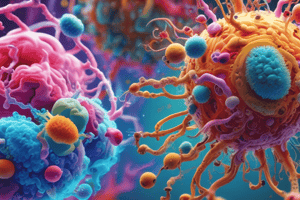Podcast
Questions and Answers
Which of the following is NOT a component of the cardiovascular system?
Which of the following is NOT a component of the cardiovascular system?
- Lungs
- Kidneys (correct)
- Blood vessels
- Heart
Which of the following is responsible for the electrical excitation of the heart?
Which of the following is responsible for the electrical excitation of the heart?
- Conducting cells (correct)
- Contractile cells
- Cardiac muscle fibers
- Extracellular recordings
What is the effect of altered serum electrolyte concentrations on the electrocardiogram (ECG)?
What is the effect of altered serum electrolyte concentrations on the electrocardiogram (ECG)?
- Increased amplitude of ECG waves
- No effect
- Changes in ECG morphology (correct)
- Decreased amplitude of ECG waves
What is Laplace's Law in relation to the cardiac cycle?
What is Laplace's Law in relation to the cardiac cycle?
What is the Fick Principle used for?
What is the Fick Principle used for?
What is the primary mechanism for nervous control of heart rate?
What is the primary mechanism for nervous control of heart rate?
Which process transports molecules throughout the body, including oxygen, in a stream of pumped fluid?
Which process transports molecules throughout the body, including oxygen, in a stream of pumped fluid?
What is the role of the heart in the circulatory system?
What is the role of the heart in the circulatory system?
What is the term for the time period in which the heart is contracting?
What is the term for the time period in which the heart is contracting?
What is the formula for calculating cardiac output?
What is the formula for calculating cardiac output?
What is the term for the constriction of blood vessels due to contraction of smooth muscle cells?
What is the term for the constriction of blood vessels due to contraction of smooth muscle cells?
What are the two classes of mechanisms that can alter vessel tone?
What are the two classes of mechanisms that can alter vessel tone?
Which layer of the blood vessels consists of smooth muscle cells that provide mechanical strength and contractile force?
Which layer of the blood vessels consists of smooth muscle cells that provide mechanical strength and contractile force?
Which type of blood vessels are capable of great degrees of distension and elastic recoil due to the numerous elastic fibers present in the tunica media?
Which type of blood vessels are capable of great degrees of distension and elastic recoil due to the numerous elastic fibers present in the tunica media?
Which class of arteries serves as stiff conduits that are not very prone to collapse, and contains a high proportion of smooth muscle cells but less elastic fibers compared to elastic arteries?
Which class of arteries serves as stiff conduits that are not very prone to collapse, and contains a high proportion of smooth muscle cells but less elastic fibers compared to elastic arteries?
Where does the main resistance to blood flow take place?
Where does the main resistance to blood flow take place?
What is the innermost layer of all blood vessels called?
What is the innermost layer of all blood vessels called?
Which type of blood vessels have the largest veins in the systemic circuit?
Which type of blood vessels have the largest veins in the systemic circuit?
Which equation represents the fundamental relationship between flow, pressure, and vascular resistance?
Which equation represents the fundamental relationship between flow, pressure, and vascular resistance?
When a blood vessel constricts, what happens to the blood flow through that vessel?
When a blood vessel constricts, what happens to the blood flow through that vessel?
What is the product of cardiac output and total peripheral resistance?
What is the product of cardiac output and total peripheral resistance?
Which type of blood vessels have one-way valves in the heart and veins?
Which type of blood vessels have one-way valves in the heart and veins?
Which type of blood vessels give rise to high-resistance vessels called arterioles?
Which type of blood vessels give rise to high-resistance vessels called arterioles?
What is the function of the kidneys in relation to blood flow?
What is the function of the kidneys in relation to blood flow?
According to the text, what is the primary function of the cardiovascular system?
According to the text, what is the primary function of the cardiovascular system?
What is the diffusion coefficient (D) of most small solutes in dilute aqueous solutions?
What is the diffusion coefficient (D) of most small solutes in dilute aqueous solutions?
If the outer layers of the heart were solely dependent on receiving nutrients diffusing from the ventricular lumen, how long would it take for a nutrient to diffuse from the lumen to the outer layers of the epicardium?
If the outer layers of the heart were solely dependent on receiving nutrients diffusing from the ventricular lumen, how long would it take for a nutrient to diffuse from the lumen to the outer layers of the epicardium?
Which of the following is NOT a role of the cardiovascular system?
Which of the following is NOT a role of the cardiovascular system?
What is the time needed for oxygen molecules to diffuse the appropriate distances at the interface with the environment (lungs) and between blood vessels and cells?
What is the time needed for oxygen molecules to diffuse the appropriate distances at the interface with the environment (lungs) and between blood vessels and cells?
What is the equation that shows the time (t) it takes a molecule to move a distance x in one direction in free solution?
What is the equation that shows the time (t) it takes a molecule to move a distance x in one direction in free solution?
Flashcards are hidden until you start studying




